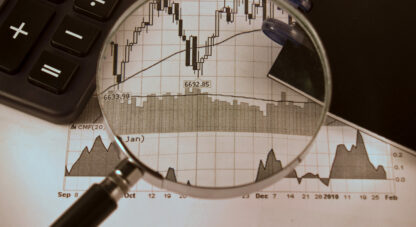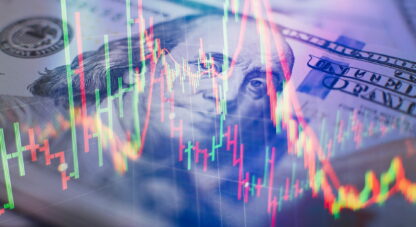Podcast: Play in new window
- Redirected Oil Flows & Capital Flows Could Lead To A New Reserve Currency.
- What Does The Price of Tea In China Have To Do With Saudi Arabia? Who’s Wealth Effect?
- 78% of Households Live Paycheck To Paycheck, This Is Twice The Number It Was In 2006
The McAlvany Weekly Commentary
with David McAlvany and Kevin Orrick
“You can go back to China, you can go back to Russia – we come full circle to the issue raised in so many of our client conferences and our Q&As. Will we in the U.S. retain the reserve currency status? I think the answer is a little bit like that to freedom or democracy. The answer is yes – if you can keep it.”
– David McAlvany
Kevin: David, I’m talking to you remote right now in your fancy Airstream trailer. I have to tell you something, Dave. I know you have been to four states and you are using this Airstream to keep the family with you while you do these conferences and consultations. But I’m jealous because when I was a kid I wanted to be an astronaut. I was six years old when Neil Armstrong and Buzz Aldrin walked on the moon, and every time the Apollo astronauts came back they brought them up to the carrier but they put them right into this beautiful Airstream and they quarantined them in there. So really, I’m jealous. Since I was a kid I wanted an Airstream. How is it?
David: (laughs) Well, four states and hundreds of clients later, our family is having a great time on the road, and the Airstream is a dream. We’ve been telling hypothetical stories of cross-country travel in an Airstream for years. That is one of our bedtime story-telling rituals. So I actually had to clarify with one of our clients – they knew we were traveling together as a family, and they said, “Well, that must be quite nice travelling in your Gulfstream.”
Kevin: A Gulfstream – the airplane – a jet.
David: I said, “That’s very far from reality.” But the Airstream, the silver bee, the RV, is travelling well and it is serving as a mobile office and is a classroom for the kids, and as occasionally a romp-room for the wrestling boys and always the culinary capsule three times a day. So it’s been quite a trip so far.
Kevin: Legacy has been part of the message that you have had all along, and that includes family. Strangely enough, even when we have consultations with our clients, it’s a little different than your normal Wall Street firm. Oftentimes one of our kids is there and learning the ropes of what you do, just like you did with your dad, Dave. I remember you as a teenager, but I remember some of your younger siblings being with us on conferences when they were four, five, six years old. There is an awful lot that they can absorb when they see what Dad does for a living.
David: I think it is surprising the ways that we learn by osmosis, and the things that we might not, in the moment, be able to translate into propositions which are a part of our life, but I know that when I went to college I had a different perspective on things than most people and I attribute a lot of that to the way in which we grew up, which, a part of that was travelling with my dad. At one point my dad was travelling a lot. Three weeks out of the month was common, so three out of four.
He decided at one point to get an RV and take us with him. So I actually learned to walk in a Winnebago and Molly McAlvany, my older sister, myself, the German Shepherd – we did that for a long time, and actually, it worked well until one week we got lost – well, we weren’t lost but I think my mom almost lost her sanity in Seattle, where my dad would leave and go to a series of meetings and the nonstop rain, making more noise than you can imagine on the outside of the Winnebago just about drove her crazy.
Kevin: So you guys had the first sleepless in Seattle. Well, you’ve been to KC – Kansas City – the twin cities, Philadelphia, Charlotte. You’re on your way to Austin and you have several more conferences to go – Orlando and Naples. And from here on out you are going to have the family with you.
David: In almost every location there is a convergence of interest around the state of the markets and the sustainability of the trends that are in place relating to the markets, obviously an interest in metals and the direction that they take. There are also concerns about the underlying fragility of a debt-based economy, and a number of questions have emerged in that Q&A that we have had each time around the hydrocarbon-based economy, and around a dollar-based global monetary system. It is interesting to consider how those last two themes interact.
Kevin: Who would have thought that you would be talking about U.S. treasuries with that, but the entire strength of the United States has been based on this petro dollar relationship, with the Middle East, with Europe, the reserve currency status. In fact, you got to know a former Treasury employee a few weeks ago. You have been talking at the conference a little bit about your conversation. I would love for you to bring that into light because treasuries and the support of the dollar really weigh in to each one of the other areas – the debt, the hydrocarbon-based economy, the dollar-based economy, petro dollar – all of that. If our creditors are not buying treasuries, the dollar doesn’t continue.
David: It was a curious, but I think very insightful, conversation, with a former Treasury employee stationed in Saudi Arabia for the better part of a decade. The dollar’s status on the world stage came back into view in this conversation. We ran into each other in the Carolinas – this was an earlier trip that I took through the Carolinas – but certainly, as a proponent of gold, the idea of losing our standing as world reserve currency, that has been a theoretical discussion of theoretical risk that has been on our minds for years. But to us, it is in the category of curious dinner topics on issues which can’t ever be fully resolved because there is a complexity and how many contributing factors are a part of that. There are almost too many contributing factors to figure out when and how that might happen. Maybe it happens.
Kevin: Let me ask you, Dave, does it happen? There is an awful lot of talk on the Internet right now about the loss of the dollar, having the loss of reserve currency status, maybe to China. Does it happen slowly, does it happen quickly? What does it look like?
David: I can tell you, this conversation I had a few weeks ago, that is what made it particularly interesting because we both shared the concern about loss of reserve currency status and then I assumed that perhaps because he was with Treasury, that was a generally held position, that this was something to be defended and something to remain aware of. And actually, he said, “No. Quite to the contrary. The Treasury Department has shown little interest in the topic. Yes, it’s an issue, but of such a long burn in terms of the fuse that it really isn’t an issue to worry about in our lifetime.” And I thought, “Well, gosh, that’s a little bit like Janet Yellen saying we don’t to be worried about recession in her lifetime. What are we talking about here?”
Maybe it becomes that issue like Hemingway’s comment on bankruptcy – “It happens slowly, and then all at once.” The all at once – is that generations away? Kevin, I think there are some current events that suggest otherwise.
Kevin: Dave, on that subject, what we are seeing is the rise of China very quickly. We see the economic rise of China. We also know that the number one gold producer in the world, as well as the number one gold consumer in the world – so, like your dad said, “He who owns the gold makes the rules, ultimately.” But we are seeing reorganization from the top down. We can talk a little later about the reorganization in Saudi Arabia because the two seem to be tied somewhat. But tell me a little bit about this China reorganization. It seems like there is a lot of cleaning house going on.
David: You’re right, it is a theme that my dad talks quite a bit about – “He who owns the gold makes the rules.” He says that when you see a significant power shift on the international stage, it is usually preceded by a major migration in ounces first. Gold serves as a part of the economic buttressing for collection of power, and certainly you can make that case that gold is moving to China and perhaps the power, as well. But we’re watching a reorganization from the top down in China driven by Xi-Jinping and he is transferring people out, he is dismissing people who are not on board. You know, there are people who are even disappearing – we don’t know if they have been killed. But those who are considered in that corrupt category.
And of course you can define corrupt lots of different ways – there is the on-the-take corruption, the self-centered behavior counter-productive to the party’s goals – there is that form of corruption. But it can also mean corrupt in the other sense – not a pure enough party loyalist. Or perhaps you have too much localized power, allowing for autonomy from politburo dictates.
Kevin: It reminds me of other housecleaning. We have seen every administration throughout history do some housecleaning. And they call it corruption, but corruption seems to be in the eyes of the beholder, or I guess in this case, in the eyes of the power-holder. It may be just a loyalty squeeze.
David: And you are seeing the same thing happen in Saudi Arabia as we speak with Mohammed bin Salman. There is a major shakeup in power there, and who knows that it is centered on – personal self-interest, or for the greater family, that is, the royal family, and their long-term viability. Only time will tell.
I’m reading a book by Walter Scheidel on revolution and warfare. He mentions the hereditary nobles of the fifth to third B.C. in China. This is the theme that he said happened in that same timeframe – transfer, dismiss, or kill – you just make those leaders simply go away and replace them with more obscure technocrats that owe their advancement in the party to you giving them that opportunity. And on that basis, they tend to maintain a clearer vision of their obligations to the party line and those who are leadership positions at the very top. So in some sense, China’s history is being recycled, from the third to fifth century, through Xi Jinping and his administration today.
Kevin: Do you think some of that has to do with this forward look on one belt, one road? One of the friends that you have in China who is well connected sees that as the major direction for China, Europe, the Middle East, going forward.
David: Absolutely. I think the reorganization has occurred over the last five years and will continue beyond today into the future. And really, nothing and no one will be allowed to stand in the way of the revitalization of the Chinese people and the country as a whole. And it’s the ambitions, as you mentioned, of the one belt, one road project that can’t be slowed by factions or groups of people that might want to try to milk personal benefits from the expansive development westward toward Europe and the Middle East. And that is, I think, in essence, what they are doing now. You have a purging underway, and the objectors are now able to see the cost of noncompliance. It is time to begin, at this point, moving beyond having cleaned up the house internal, to looking at how you can negotiate with outside interested parties to the west. And I think that is what we are beginning to see – the Chinese playing to those external interested parties.
Kevin: They seem to be playing this game like chess masters at this point. They have a five-year plan, and then of course you have talked about how they look 50 years into the future. One of our guests, Dr. George Freedman, a regular guest of ours, looks at the world as a chessboard. He talks about U.S. policy going forward. Some of his favorite presidents are Democrat, Republican – he doesn’t really take sides that way, but they were the ones who had a forward look to long-term U.S. policy. That seems to be lacking on our side of the Pacific.
David: Yes, and I have to caution the listeners, my views on U.S. foreign policy are my views (laughs). Talking to Michael Pettis the last time I was in Beijing, it was interesting because he would say, “Actually, the U.S. foreign policy is far more sophisticated than we give him credit for, and the Chinese live with a constant state of unsettledness about our foreign policy. So we in the West see them as strategic and insightful and ahead of the curve and thinking in terms of 40 and 50 years, and executing those plans very well, while we see ourselves as incompetents. They don’t necessarily see themselves as incompetents, but they certainly live with a greater degree of insecurity and see us with a grand strategy.
To me, again, I say that up front because clearly it is just an opinion, but to me it’s tragic that we in the States have no real grand strategy. At least, I don’t see it in our foreign policy objectives. Granted, there is a division in my thinking on this because there is part of me that desires to be somewhat isolationist and have a minimal footprint outside our borders, and then another part of me that recognizes the reality that nature abhors vacuums, and if we’re not the dominant player on the global scene, someone else would be, and I would prefer to be closer to that place or locus of power.
The powerful today don’t seem to know what to do with it, but again, that’s my opinion, my perception. We have what appears to me to have been multiple administrations back-to-back, both Republican and Democrat, which are operating like short order chefs blasting grease fires. They are solving short-term crises, but with no real over-arching agenda.
Kevin: You want to be careful not to sound like a neocon either. You’re really not talking about creating empire and maintaining empire. But there is a balance, isn’t there?
David: Yes, exactly. I don’t find myself cozy with a neocon group, but I guess I really don’t know what to say about that because I want to scold myself if I’m sounding like a neocon. On the other hand, we look at power, and vacuums that we can create, and whether it’s the Muslim world, or some combination of a Chinese-Middle Eastern-Russian axis, there will be someone to fill the vacuum if we create it.
Kevin: Dave, September 11th seemed to really throw things out of balance for our strategies. We have been to war since then in countries that really didn’t have anything to do with September 11th and like you said, it seems like we are continually putting out fires, pulling troops out and then putting them back in. There does seem to be an inconsistency with policy.
David: So look at what happened at the end of the Cold War and the fall of the Berlin Wall. You have, in a ten-year timeframe, Francis Fukuyama saying we’re at the end of history. In other words, we’re at the beginning of a new perpetual peace globally. And 9/11 shattered that notion that somehow we are not going to have threats, that we will live peaceably in some sort of a “liberal democracy.” And clearly we look back 20 years and say that really was almost laughable. It was laughable, as well-intentioned as it might have been.
9/11, in some regards, has made us afraid of our own shadow, and it has created a very expensive impetus for the security apparatus which is supposed to protect the homeland. The war on terror is, in reality, an excuse for government spending and an opportunity for private sector encroachment. And again, I think if you go back to that fall of the Berlin Wall and the end of the Cold War, there were no bad guys on the world scene to justify overseas activities. And now, after 9/11, we have everyone as a potential bad guy and that gives D.C. the latitude to spend without apology both here and abroad. It’s almost an excuse for fiscal irresponsibility, and as a Keynesian would say, propping up aggregate demand, just ad infinitum.
Kevin: We were talking about a Gulfstream and laughing a little bit about that not being an Airstream. The Gulfstream jet has seatbelts in it. Now, that’s fine. If you land a little hard a seatbelt’s fine. But when you’re flying 500 miles an hour, a seatbelt, if you were to stop suddenly a seatbelt is meaningless. And so, I’m wondering, Dave, if a lot of the security measures that we have taken, as extensive as they are, are really just like a seatbelt at 500 miles an hour. Is it more perception than reality?
David: Sure. To draw another analogy, I think our homeland security is a little bit like the FDIC protecting bank deposits. Not only do you have less than ten cents of capital for every dollar in deposit – maybe it’s more like two cents now, I haven’t looked at the numbers recently, but it certainly hasn’t improved since Sheila Bear left, the head of the FDIC. But we live in an age of daisy-chain derivatives exposure and G20 approved bail-in clauses, wherein if the banking community gets into trouble they have agreed amongst themselves that they can pick our pockets.
So I look at FDIC insurance as effectively useless, kind of like homeland security, but it’s a public policy success if people feel safe. What does that stimulate? It is so consumers can fulfill their destiny as the spender of first resort. Not that that is what we are supposed to be. In the Ford vision of everyone fulfilling their role in the corporate machine, what cog do you fill? You’re a spender. Get out there and consume. Do and fulfill your destiny.
Kevin: I think part of the perception that we have built – I know you and I have through our lifetimes because the petrodollar, this dollar reserve currency status that was based on our ability to buy oil in dollars and force the rest of the world to buy oil in dollars, has allowed us to go deeply into debt and so we can tool along. You were talking about how we are all spenders of first resort, mainly because we can go into debt. Now, a lot of that debt was supplemented or supported by the fact that we had somewhat of a monopoly on energy. Now, did I read right that Russia has now surpassed Saudi Arabia as an oil producer?
David: Critical to who we are today in the world scene, and what we are able to do, is our relationship to Middle East oil and the petro dollar recycling which has occurred. Keep in mind, the old school said you can’t run massive trade deficits without tears. You go back to Jacques Rueff’s book and his discussion of the U.S. being able, effectively, to run a deficit without tears, and it had everything to do with the petro dollar. You can go back to China, you can go back to Russia – we’re driving Russia, who in the last 12 months has moved into the number one seat for global oil production ahead of Saudi Arabia. We’re driving them into the arms of the Chinese, who to a large degree are creating this cordial courtship environment for the Chinese and the Saudis, as well. So we have come full circle to the issue raised in so many of our client conferences and our Q&As. Will we in the U.S. retain the reserve currency status? I think the answer is a little bit like that to freedom or democracy. The answer is yes – if you can keep it.
Kevin: It is interesting, we are treating Russia almost like we would treat a third world country with the sanctions and our approach to Putin and Russia. With them being the number one oil producer, if they are being driven toward China, it seems to me like that is going to have debilitating effects for our trying to keep this petro dollar status.
David: If you can keep it implies that you recognize that you may not, and you may have to be very intentional in order to keep it. I think you are right; we are not doing ourselves any favors. First – our disposition toward Russia. We have sanctions in place, which have proved useful in certain instances, like in the case of Iran where we were attempting to isolate and pressure them financially. They work great as a means to modify behavior with a given country, or even to topple a regime. But we have not, nor can we, isolate Russia in the modern era. It’s not going to happen. Toppling Putin would be a fool’s errand.
Second, you look at our massive increase in U.S. oil production. Listen, I’m not making the case that this a permanent fact set. Just that, as the facts are today, we’re importing less oil from the Saudis than we were even a few years ago. And thereby we are contributing to the creation of a new reality in the Middle East.
Kevin: So we’re taking the petro dollar for granted then.
David: In many respects we are, forgetting that our purchase of Saudi crude is a part of a quid pro quo. You get the petro dollar which is directly tied to our reserve currency status, as is the security we promise from the external threats that the Saudis may face, by having the U.S. military presence on the ground in Saudi and having arms deals with them, which kind of scratches both people’s backs. It scratches the defense industry backs here in the United States, but also does the same for the royals, at least in Saudi Arabia from external threats.
But I think, frankly, it is the internals that we seem to be forgetting about, and that is in many respects, if you look at the consequences of quantitative easing here in the United States and around the world. And we have the obvious benefit of asset prices for which Wall Street and the world’s wealthy are grateful because those are the external benefits, the obvious benefits – price improvement. But the average man in the street is living paycheck to paycheck.
This is certainly not the case all over the globe, but we can pencil this out at 78% of households in the United States living paycheck to paycheck, which is twice the number it was in 2006 prior to the global financial crisis. See if that makes sense to you for a minute. And these are folks that have a lingering sense of dread from the last global financial crisis. So you have the internals which are not quite right, even as the externals of price seem to be just fine. The same is true in the Saudi state.
Kevin: So Dave, in a way, we are behaving as though the old model is still working, the old model being that all oil flowed, in some respects, through Saudi Arabia because of their dominance in OPEC, and all oil was paid for in U.S. dollars. Now, what has happened is, the price of oil has dropped. Our production of oil here in the United States has increased. We have Russia now producing more oil than Saudi Arabia, and we are, like you said, driving them into the arms of China. So the old model is not working. Could this be what is going on in Saudi Arabia right now, which up to this point has been a billionaire’s welfare state?
David: And it is many things all at once because at the same time you have lower prices, you have succession tensions, in a reorientation with new leadership toward diversification from oil to other long-term growth opportunities targeted by 2030. And all of that takes time to develop, it takes dollars or reals to fund, and you have all of the pressures that the people who are tied to the status quo are feeling about. So really, you have the extended royal family which is not happy.
Kevin: And some of them are dying. I hate to say it, but the helicopter crash last week at the same time that you had all of these corruption cases, we haven’t even talked about the fact that 1200 bank accounts were just suddenly frozen, and you had a number of Saudi’s who wondered from one moment to the next whether they were billionaires or complete paupers. It was just with a single decree, and of course, the helicopter – I haven’t really looked into the investigations on that but you had one of the high-ranking officials that was taken out, one of the princes that was taken out, literally, with a helicopter crash at the same hour that the bank accounts were being frozen.
David: I can tell you that any time there is insecurity felt on the ground in Saudi Arabia, whether it is the external type which might come from the Russians swooping down from the north à la 1989, or internal tensions and pressures where a number of people feel like they are not going to be able to keep their old cash flows – I can tell you there is money that goes scrambling into gold in the Middle East because they want something that is private and portable and can be moved off of a runway in Saudi Arabia onto a runway just outside of Geneva or Zurich.
So it is interesting, there is this huge irony in Saudi political turmoil because, as you mentioned, it is just a welfare state. It just happens to have a few more digits behind every number, but it is still just a welfare state. And in real time you have a political quagmire that the throne is trying to deal with. Why? Because, again, there is not as much revenue coming in from oil. But it is no different than what we have in the United States – political volatility is on the rise, and it is in the rising of the tide with income in wealth and equality. Equality – I don’t think it will ever exist, but when you have degrees of inequality widening, that can drive the masses to madness, and to revolution.
Kevin: Dave, you talked about gold with the Saudi Arabian thing. On Friday I had to reminisce a little bit because the gold price dropped about $10 – it wasn’t huge – but it turned out that there was about four million ounces sold into the market within a 30-minute period. It reminded me of the bear raids of 1989. As Saudi Arabia was preparing for the Kuwait war they could come in and sell two million ounces on the market – on a Monday morning when it was quiet, knock the market down 20 or 30 dollars and then they would come back in and buy four to six million over the next few weeks.
I’m not saying Friday was a bear raid, but it does seem that when money starts to freeze up, like you said, when people start to become insecure in Saudi Arabia, and those oil countries around the region, you start to see strange things happen on gold – a sudden drop, and then over the next few weeks, a tremendous amount of buying.
David: My take is maybe a little bit different on that and one of the themes that we have in the conference, between my dad and I, and look forward to meeting folks in Austin and Orlando and Naples, Florida here in the next few weeks. But you have a massive amount of manipulation which has occurred from 2012 to the present, and at key technical levels, where gold, if it was trading in a free market, would have held. In fact, it got clobbered, where you had massive amounts of liquidations at a critical technical point, breaking through those critical support levels, and breaking down the psychology within the marketplace.
What I love to see, though, is this. Roll the clock back to 2013 and 2014 when this kind of dumpage of ounces equated to a $50-100 decline in gold. And then fast forward to 2015-2016, the same dumpage of ounces equates to a $20 or $30 drop in gold. And now, the equivalent – again, four million ounces is a lot of ounces, and a lot of dollar value, and it has moved the market ten dollars. What you are seeing is the diminishing effect of a manipulation attempt in the marketplace, and that is true, you can manipulate any market, and all markets are manipulated to a degree, but you can’t do it forever, because real buyers ultimately re-emerge and overwhelm the volume of liquidations that you have, bringing stability to price.
So I look at the world that we’re in. I think we’re moving toward a world, over the next three to five years – this is not super long-term – of redirected oil flows, check that box, of redirected capital flows, check that box, and are we not quickly moving toward a world where currency relationships erode or shift or alter in some way? You look at the Treasury Department today and so far the U.S. Treasury has showed no real concern over our currency status on the world stage. Why? We assume the limelight. Yet, one of the pillars to our currency stability, and therefore price stability, is tied to long-term reciprocity with the Saudis.
Kevin: And not just the Saudis. Look at Japan, China, the Middle East. They’ve been buying treasuries based on a model, and a big part of that is a geopolitical model that has changed.
David: That’s right. It’s Japan, it’s China, it’s the Middle East – these are the buyers of our treasuries, and they’ve done this for years for political reasons, or if you want to call if foreign relations reasons. You look at the same kind of thing happening now with the interest China is showing, not only in opening the gateway to the West via the one belt, one road project, but also in directly owning a big chunk of Saudi Aramco, the largest oil company in the world.
And it’s a clear message to the international community. The Chinese ambitions of regional dominance and global influence, they are extending via the PBOC, the People’s Bank of China, and through the subsidized investments which they have made throughout the world, continental Africa, obviously, throughout the Middle East, and this would be, probably, one of the largest single investments that the Chinese would have made. But Saudi is being courted by the Chinese at the same exact time we are creating uncertainties in our own relationship with the Saudis and in the region. Can’t be good for us.
Kevin: It’s interesting, if I look back at my adult lifetime, actually, my entire lifetime, he who owns the gold makes the rules, but he who owns the petro currency seems to make the rules, as well, and that is what we are talking about here. We’ve been calling it the petro dollar, just assuming that it would stay the same, the petro dollar, but I think we should start looking at calling it the petro currency. It’s like a jump ball. Somebody is jumping, somebody is going to hit that ball, and somebody is going to come down with possession. Whoever comes down with possession – that is going to change the face of the globe.
David: Absolutely, and this is a part of where history will not repeat exactly because in past periods where you had global currency dominance, it was in a pre-industrial world. Go back to when the British ran things. Go back to when the Dutch ran things, the Portuguese or the Spanish ran things, and oil was not central to the equation for currency stability. Gold was the only factor, and that basically created the financial backing and the financial footing, if you will, for banking and lending and trade. But now banking, lending, and trade have a lot to do with capital flows, who controls the flows, and who is inviting for those flows. I think gold still has a part to play, but oil is, as you say, a very critical component. You have the one belt, one road program which is a reason for hope. It is a vision of the future. And I’m talking about a vision of the future for Russia, and for the Saudis, which would benefit from it as it comes to fruition. But I think this is where, again, we’re taking some things for granted. U.S. oriented unipolarity – this idea that we are the decision-maker in the world, if not after World War II, certainly since the 1980s and early 1990s at the close of the Cold War. That may go away, and with it, many of the assumptions we hold about U.S. domestic price stability, because again, we tie that, we have that benefit, because of our broad currency float.
Kevin: What that has allowed us to do, Dave, is spend money and borrow money without the need to really ever repay it, because with the petro dollar status, with the reserve currency status, everyone who borrows money from us, they borrow it in our currency. When we borrow money, we borrow it in our currency. A lot of that has been supported because we had the petro currency at the time. And that seems to change the model.
David: Yes. So we go from a deficit without tears back to a world full of tears, and people scratching their heads, wondering, “What has changed? Did I miss something? Why all this sadness?” We have Xi Jinping who is consolidating power. We have Mohammed bin Salman in Saudi Arabia – he is dealing with Saudi Arabia, caught in the tides of change. Within not only the geography of Middle East Islamic tensions, the broadly speaking Sunni versus Shi’a conflict, but more specifically, the Saudi versus Iranian conflict. And again, you are seeing cracks within the hydrocarbon-based economy. You have the old school in the Saudi royal family who see him as a danger, and in the midst of consolidating power for personal gain.
Kevin: Dave, we’ve kept it somewhat economic today on the talk, but the Shi’a/Sunni war that has been continually going on for hundreds of years seems to be also a big part of this. Saudi Arabia, Yemen, Iran, the flow of arms to Hezbollah – all those things that, actually, our guest, Kamran Bokhari has given great detail on. It seems like we are starting to see those things come to fruition. You talk about the financial moving to the economic, the economic moving to the political, the political moving to the geopolitical or the geostrategic. We’re seeing, really, all of those factors, especially the last two, coming into play at this point.
David: Yes, and of course, things become more difficult in lots of different political spheres, and we see that in Saudi Arabia, we see that in China, and thus the consolidations of power, the purges, the cleansings, if you will, which are occurring here and there. So you have cracks, consolidations, and this is really a pivotal moment in time, not only in the Middle East, but in China. And we have to be very careful about new trajectories that are being set, which may minimize our importance on the world scene.
Coming full circle, Kevin, the conferences that we have done with clients have revealed, over and over again, the interest in what is happening from a broad perspective, and at a micro-level, within each of the markets, whether it is gold, silver, platinum, palladium, oil – we have had some great questions on the oil markets, some fantastic questions dealing with derivatives, great questions dealing with the stock market, and just a really in-tune listenership, readership, and audience at these conferences.
None of us knows what the future holds. That is the only certainty. We do our very best to remain appraised of what is changing and what the contributing factors are to changes and shifts within the financial markets. But this is absolutely one of the most fascinating times to be alive as an investor. You can assume nothing about what has existed, and what may exist in the future.
Specifically, we come back to this point of reserve currency status being at the bedrock of all that we know in terms of fiscal, monetary, and general economic stability in the United States. We simply can’t take it for granted.
Kevin: Yes, even geopolitical.
David: That’s right.
Kevin: Dave, as we wrap up, one of the things that I think most of the listeners and the people at the conferences have brought up is the artificial feeling of security. Everyone seems to sense that it is artificial. They seem to sense that there are cracks. Yet, like you were talking about with homeland security, as long as people somewhat feel safe, things will continue to the next day, and then the next day. But your recommendation, and your dad’s recommendation, over and over, is to keep your powder dry. Don’t buy into this false sense of security because things are about to change. Do you have a comment on that before we close?
David: As boring as it may seem, the idea of keeping extra liquidity, and in multiple forms – I understand people are enticed to look at the latest greatest way to become a millionaire – I am more inclined, as you say, to keep the powder dry and some combination of cash and metals – metals as an offset to a mismanaged cash position by our U.S. Fed – I think it makes sense to create a balance there. There will be better days and better times to be putting capital to work for us.
We live today with certain command and control dynamics in the marketplace, and that is a period of time where price is almost irrelevant as a data point. And with that in mind, it is almost impossible to judge what your risk/reward calculus is. You don’t have to play. This is a time to be cautious and be ready, certainly rehearse in your mind what it looks like to put those dollars, cents or ounces to work for you, because I think we are within a very short period of time away from being able to do just that.
















